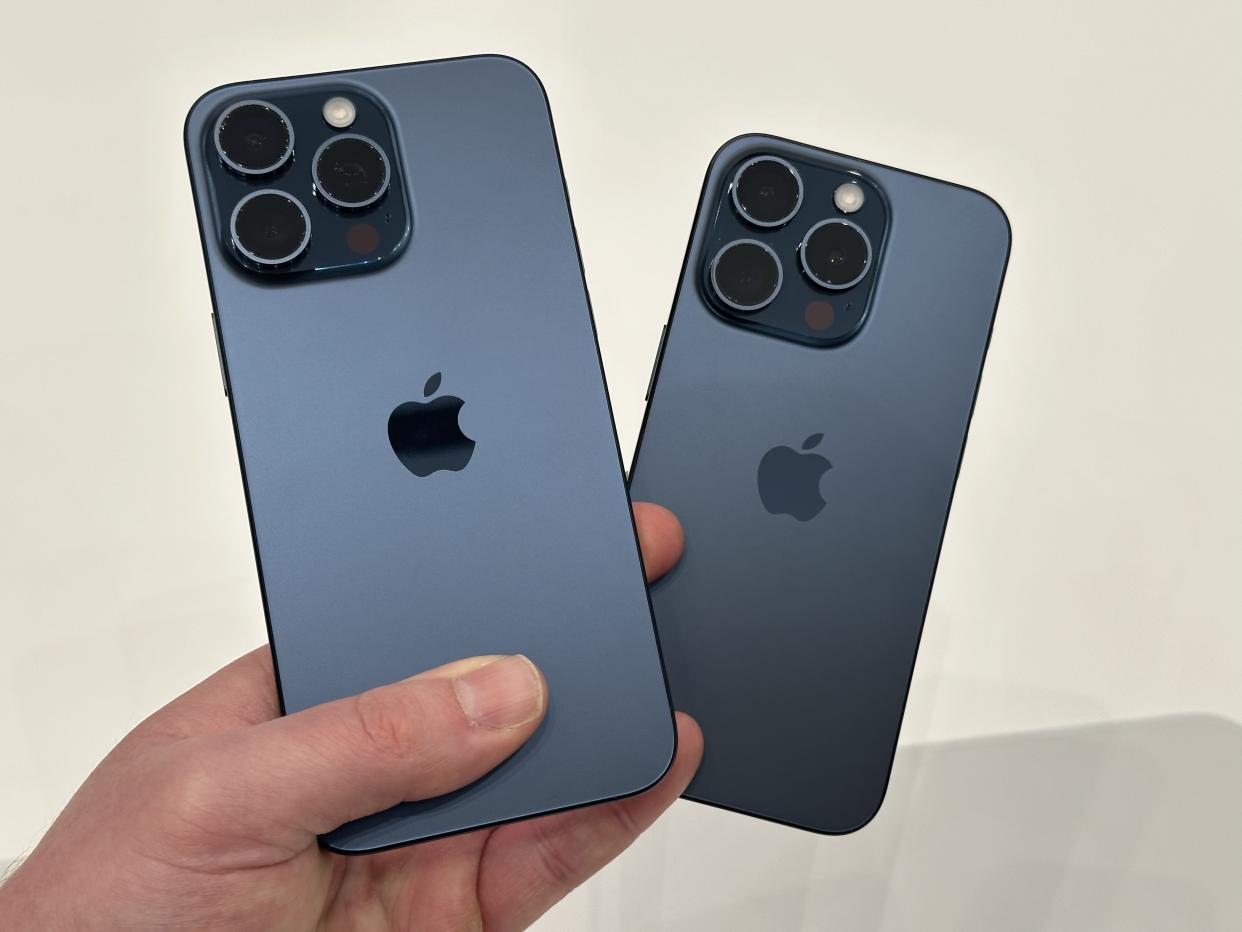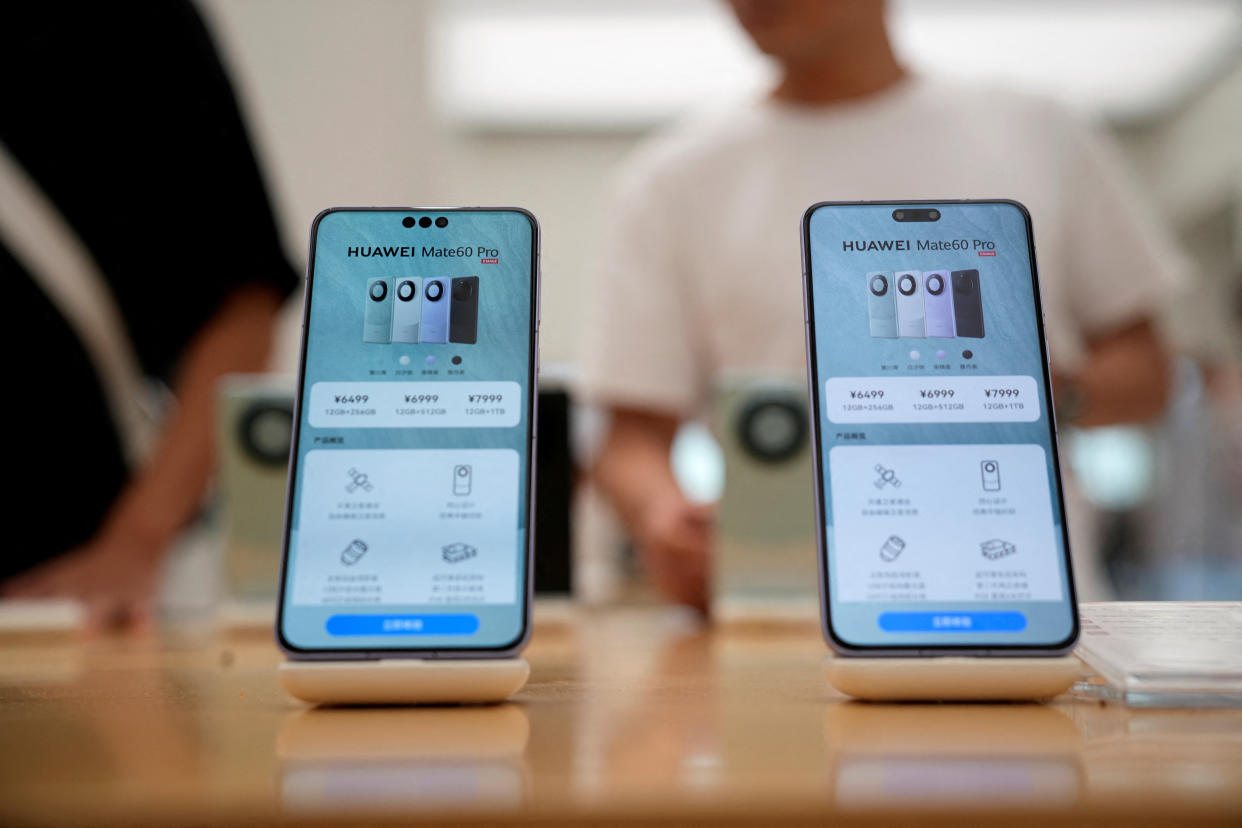Apple is launching the iPhone 15 during the worst time for smartphones in years
Apple (AAPL) debuted its iPhone 15 and iPhone 15 Pro lines on Tuesday, bringing along new cameras, high-powered performance, and, most noteworthy of all, USB-C charging ports. But the company’s latest and greatest are landing during one of the most difficult times for the smartphone industry in years.
Through the first nine months of the year, Apple’s iPhone sales fell to $156.8 billion from $162.9 billion in the same period last year. Apple CFO Luca Maestri acknowledged the slowdown during the company’s third quarter earnings call, saying the market has been in decline for the last few quarters in the United States.
But things might not be as bad for Apple’s newest iPhones as they are for the company’s Android-powered rivals, including Samsung, Motorola, and Google (GOOG, GOOGL). The reason? High-end phones continue to sell well, as mid- and entry-level device sales falter.
"We're expecting that the global smartphone market this year will decline about 5%. That's … the third year of contraction in a row," said Ryan Reith, vice president of IDC’s Mobile Device Tracker suite. "But Apple will actually grow about 1%."
That said, trouble could be brewing for Apple in one of its biggest markets, as reports say China is clamping down on iPhone usage among government workers, though the country's foreign ministry said it hadn't instituted a ban, and Huawei debuts a new phone that could win back users who ditched the brand when US sanctions all but crushed it in 2020.
Trade-ins and buy now, pay later are helping Apple
The global smartphone market is in its worst slump in a decade. There’s no single reason for the decline, but rather a confluence of events. Foreign exchange headwinds are eating into Apple’s margins, and rising interest rates and inflation aren’t helping matters either. And then there’s the fact that many consumers already purchased new electronics devices during the COVID pandemic, leaving them with little reason to run out and upgrade.

But Apple has benefited nicely from generous trade-in offers from carriers and merchants worth upward of $1,000 toward the purchase of a new iPhone.
"That's actually helped facilitate a relatively, I wouldn't say strong, but a better higher end of the market than what we've seen for the rest of the market globally, the mid-range and the low-end, which is really suffering," Reith said.
It’s not just trade-ins, though. Buy now, pay later programs that let consumers purchase more expensive devices and pay them off via smaller monthly payments have also buoyed Apple's sales.
According to Counterpoint Research, the lift from stronger premium market sales could push Apple to become the world leader in annual device shipments for the first time ever.
"It’s the closest Apple’s been to the top spot. We’re talking about a spread that’s literally a few days’ worth of sales," Counterpoint Research director Jeff Fieldhack said in a press release. "Assuming Apple doesn’t run into production problems like it did last year, it’s really a toss up at this point."
China troubles lurking
Though Apple is outperforming its peers thanks to its premium device strategy, there are some potential problems on the horizon. According to The Wall Street Journal, the Chinese government has banned central government workers from using iPhones in the office or for work.
On Wednesday, however, the country's foreign ministry said it hadn't instituted a ban and that all foreign and domestic companies are treated as equals, according to Reuters.
While the move in and of itself may not hurt Apple sales, it could spark a fervor against the tech giant. That’s not all, though. China’s Huawei recently announced a new smartphone called the Mate 60 Pro that appears to include an advanced processor and cellular connectivity speeds on a par with 5G technology.
That’s important, because US government sanctions against the company and the Chinese government were supposed to prevent those kinds of capabilities from reaching the country’s companies and military.
Beyond that, however, it could mean that Apple is facing a renewed threat from Huawei in China’s premium smartphone segment. US sanctions essentially crippled Huawei’s ability to produce smartphones that could match Apple’s iPhones. As a result, consumers began buying more iPhones to get their hands on high-end 5G devices.

In fourth quarter 2020, Huawei controlled 23% of China’s smartphone market share. But the company couldn’t hold on to consumers as US sanctions took hold, and, in fourth quarter 2021, Apple regained market share lead in the country for the first time in six years, according to Counterpoint.
But if the Mate 60 Pro is the real deal, Chinese consumers could end up switching back to Huawei, cutting into Apple’s sales in the country.
For now, it looks as though Apple is set up for a relatively strong finish to 2023. What all of this means for 2024 and beyond, though, is still unclear.
Daniel Howley is the tech editor at Yahoo Finance. He's been covering the tech industry since 2011. You can follow him on Twitter @DanielHowley.
Click here for the latest technology business news, reviews, and useful articles on tech and gadgets
Read the latest financial and business news from Yahoo Finance

